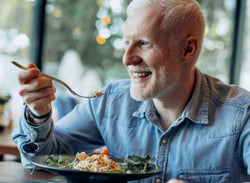Your Questions Answered
We recently hosted a live webinar in partnership with The Feeding Trust where we explored what’s meant by an integrated approach to paediatric feeding difficulties. If you missed it, you can watch it back here.
We had so many questions come through during the evening that we weren’t able to get to them all! So, we sat down with our expert speech and language therapist Natalie Morris to answer all your burning questions. Have a read below…
Your Questions Answered
We recently hosted a live webinar in partnership with The Feeding Trust where we explored what’s meant by an integrated approach to paediatric feeding difficulties. If you missed it, you can watch it back here.
We had so many questions come through during the evening that we weren’t able to get to them all! So, we sat down with our expert speech and language therapist Natalie Morris to answer all your burning questions. Have a read below…
What are your views around rewarding after meals?
In a typically developing or slightly faddy eater, rewarding an extra mouthful of broccoli with pudding is fairly typical. However, with a child or young person with a paediatric feeding disorder (PFD), there are genuine barriers to eating. There is a complex interplay between perceived success/failure with food, social-emotional factors and family relationships. We are very careful around the language we use at mealtimes to reinforce the skills needed to become a competent eater and avoid mealtime battles. For example, we will praise good cutting, smelling, licking or touching, but don’t give specific praise to reward ‘good eating’ – the inherent message there is that there is ‘bad eating’ and therefore failure.
We have a mantra ‘food is just food’; we avoid talking about food as yummy, delicious, disgusting, favourite etc. We will also encourage parents to spend a little time outside of mealtimes every day encouraging and rewarding non-eating related behaviour such as play skills, to remove pressure on the child to perform ‘well’ at mealtimes.
Would the input of a dietitian, occupational therapist, clinical psychologist and speech and language therapist be beneficial in managing every infant with a feeding difficulty?
Not necessarily, it really depends on the complexity of the case and how many ‘red flags’ there are, how problematic mealtime behaviours and routines are, if there are any other developmental concerns and how restricted the diet is.
A good point of reference is our infographic – if a child or young person has challenges across multiple domains then multiple professionals will need to be involved. The key to successful treatment is ensuring a co-ordinated approach is taken and parents are adequately supported to implement advice in a consistent way.
Are there any published guidelines or resources you would recommend looking at in relation to feeding difficulties?
Yes, there is an advice pack for parents ‘Making Mealtimes Goodtimes’ available here. This is a great guide for parents to refer to, alongside your own professional advice. There is also a wealth of information for parents and professions at https://www.feedingmatters.org/. Feeding Matters are an organisation who advocate, educate and research into all things PFD.
In terms of diverse families, what are your thoughts on eating with hands? Does this help at all?
Absolutely - we actively encourage children to explore food with their hands, it is a big part of feeding therapy. Our advice is always to develop a child’s ability to self-feed (where they are physically able to). Our occupational therapists (OT) will work with the child to develop the hand skills they need to be able to feed themselves, with and/or without cutlery, or using adaptive equipment to facilitate a child’s ability to self-feed.
What are your thoughts on parents giving their child a screen to encourage them to eat?
When referred to our clinic, many of our children need a screen in order to eat. A large part of our therapy is to teach children the skills they need to be able to feed themselves, to actively participate in and enjoy mealtimes. Children need to be able to see, tolerate and actively engage with food to learn these skills, so in most cases, the screen is removed. However, there is a gradual and systematic way of doing this, not just simply removing the screen. For example, at the start of therapy, the screen is removed when the child is learning about new foods, but is still allowed to ensure the child takes in sufficient calories and nutrition. As the child’s skills with food increase, screen usage will be decreased.
As a dietitian, can I ask about the other factors e.g., posture and positioning, or do those questions need to be asked by the correct speciality, in this case OT?
Absolutely ask the questions, it’s amazing how many things that you find out about when you ask about other factors. Very often these factors add up to a complex clinical and functional picture, all of which may be impacting on a child or young person’s willingness to eat. It may not be your place to offer advice about these factors, but you can acknowledge the multiple challenges faced by the family and refer on to the appropriate professionals. Our feeding team will quite often make referrals on, for example to specialist sleep practitioners, enuresis clinics and ear nose and throat (ENT).
What are your views around rewarding after meals?
In a typically developing or slightly faddy eater, rewarding an extra mouthful of broccoli with pudding is fairly typical. However, with a child or young person with a paediatric feeding disorder (PFD), there are genuine barriers to eating. There is a complex interplay between perceived success/failure with food, social-emotional factors and family relationships. We are very careful around the language we use at mealtimes to reinforce the skills needed to become a competent eater and avoid mealtime battles. For example, we will praise good cutting, smelling, licking or touching, but don’t give specific praise to reward ‘good eating’ – the inherent message there is that there is ‘bad eating’ and therefore failure.
We have a mantra ‘food is just food’; we avoid talking about food as yummy, delicious, disgusting, favourite etc. We will also encourage parents to spend a little time outside of mealtimes every day encouraging and rewarding non-eating related behaviour such as play skills, to remove pressure on the child to perform ‘well’ at mealtimes.
In terms of diverse families, what are your thoughts on eating with hands? Does this help at all?
Absolutely - we actively encourage children to explore food with their hands, it is a big part of feeding therapy. Our advice is always to develop a child’s ability to self-feed (where they are physically able to). Our occupational therapists (OT) will work with the child to develop the hand skills they need to be able to feed themselves, with and/or without cutlery, or using adaptive equipment to facilitate a child’s ability to self-feed.
Would the input of a dietitian, occupational therapist, clinical psychologist and speech and language therapist be beneficial in managing every infant with a feeding difficulty?
Not necessarily, it really depends on the complexity of the case and how many ‘red flags’ there are, how problematic mealtime behaviours and routines are, if there are any other developmental concerns and how restricted the diet is.
A good point of reference is our infographic – if a child or young person has challenges across multiple domains then multiple professionals will need to be involved. The key to successful treatment is ensuring a co-ordinated approach is taken and parents are adequately supported to implement advice in a consistent way.
What are your thoughts on parents giving their child a screen to encourage them to eat?
When referred to our clinic, many of our children need a screen in order to eat. A large part of our therapy is to teach children the skills they need to be able to feed themselves, to actively participate in and enjoy mealtimes. Children need to be able to see, tolerate and actively engage with food to learn these skills, so in most cases, the screen is removed. However, there is a gradual and systematic way of doing this, not just simply removing the screen. For example, at the start of therapy, the screen is removed when the child is learning about new foods, but is still allowed to ensure the child takes in sufficient calories and nutrition. As the child’s skills with food increase, screen usage will be decreased.
Are there any published guidelines or resources you would recommend looking at in relation to feeding difficulties?
Yes, there is an advice pack for parents ‘Making Mealtimes Goodtimes’ available here. This is a great guide for parents to refer to, alongside your own professional advice. There is also a wealth of information for parents and professions at https://www.feedingmatters.org/. Feeding Matters are an organisation who advocate, educate and research into all things PFD.
As a dietitian, can I ask about the other factors e.g., posture and positioning, or do those questions need to be asked by the correct speciality, in this case OT?
Absolutely ask the questions, it’s amazing how many things that you find out about when you ask about other factors. Very often these factors add up to a complex clinical and functional picture, all of which may be impacting on a child or young person’s willingness to eat. It may not be your place to offer advice about these factors, but you can acknowledge the multiple challenges faced by the family and refer on to the appropriate professionals. Our feeding team will quite often make referrals on, for example to specialist sleep practitioners, enuresis clinics and ear nose and throat (ENT).
During the evening we also received several questions relating to our new product, ActaJuni Shake.
AYMES registered dietitian Clare James answers your product focused questions…
For published articles, you may like to read:
- Goday, PS., Huh, SY., Silverman, A., Lukens, CT., Dodrill, P., Cohen, SS., Delaney, AL., Feuling, MB., Noel, RJ., Gisel, E., Kenzer, A., Kessler, DB., Kraus de Camargo, O., Browne, JP., James, A. (2019). Pediatric Feeding Disorder: Consensus Definition and Conceptual Framework. Journal of Pediatric Gastroenterology and Nutrition; 68(1): 124-129.
- Toomey, KA. and Ross, ES. (2011). SOS approach to feeding. Perspectives on swallowing and swallowing disorders (Dysphagia); 20(3): 82-87.
- Greer, AJ., Gulotta, CS., Masler, EA. and Laud, RB. (2008). Caregiver stress and outcomes of children with pediatric feeding disorders treated in an intensive interdisciplinary program. Journal of Pediatric Psychology; 33: 612–620.
- Berlin, K., Davies, W. H., Lobato, D., and Silverman, A. (2009). A biopsychosocial model of normative and problematic pediatric feeding. Children's Health Care; 38(4): 263–282.
- Milano, K., Chatoor, I. and Kerzner, B. (2019). A Functional Approach to Feeding Difficulties in Children. Current Gastroenterology Reports; 21(10): 51.
- Boyd, K. (2007). The effectiveness of the Sequential Oral Sensory Approach group feeding program (. Doctoral dissertation). Retrieved August 12, 2008, from ProQuest Dissertations & Theses (PQDT) database. Dissertation Abstract International, B 69/01, p. 665.
- Crist, W., and Napier-Phillips, A. (2001). Mealtime behaviors of young children: A comparison of normative and clinical data. Journal of Developmental & Behavioral Pediatrics; 22(5): 279–286.











